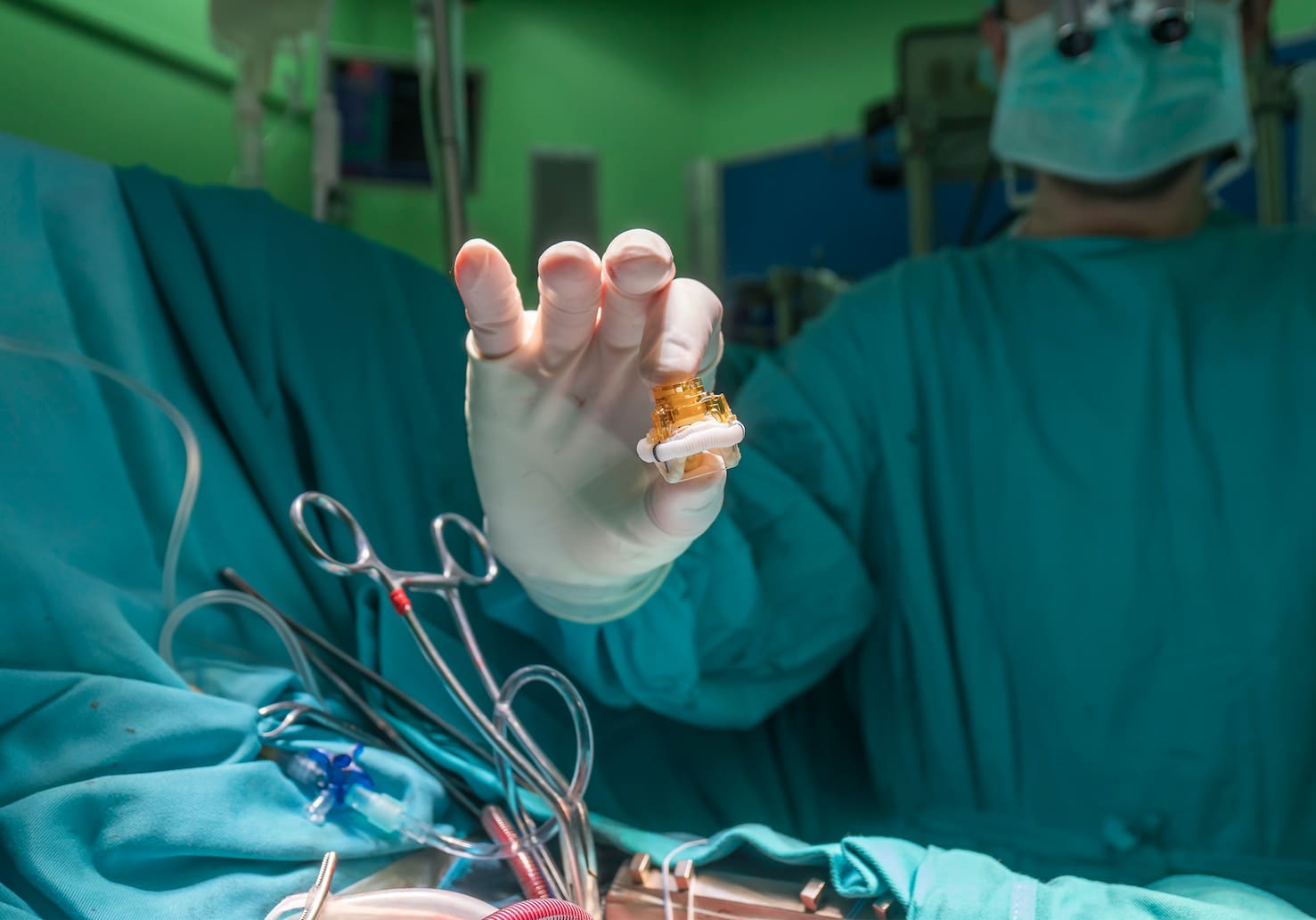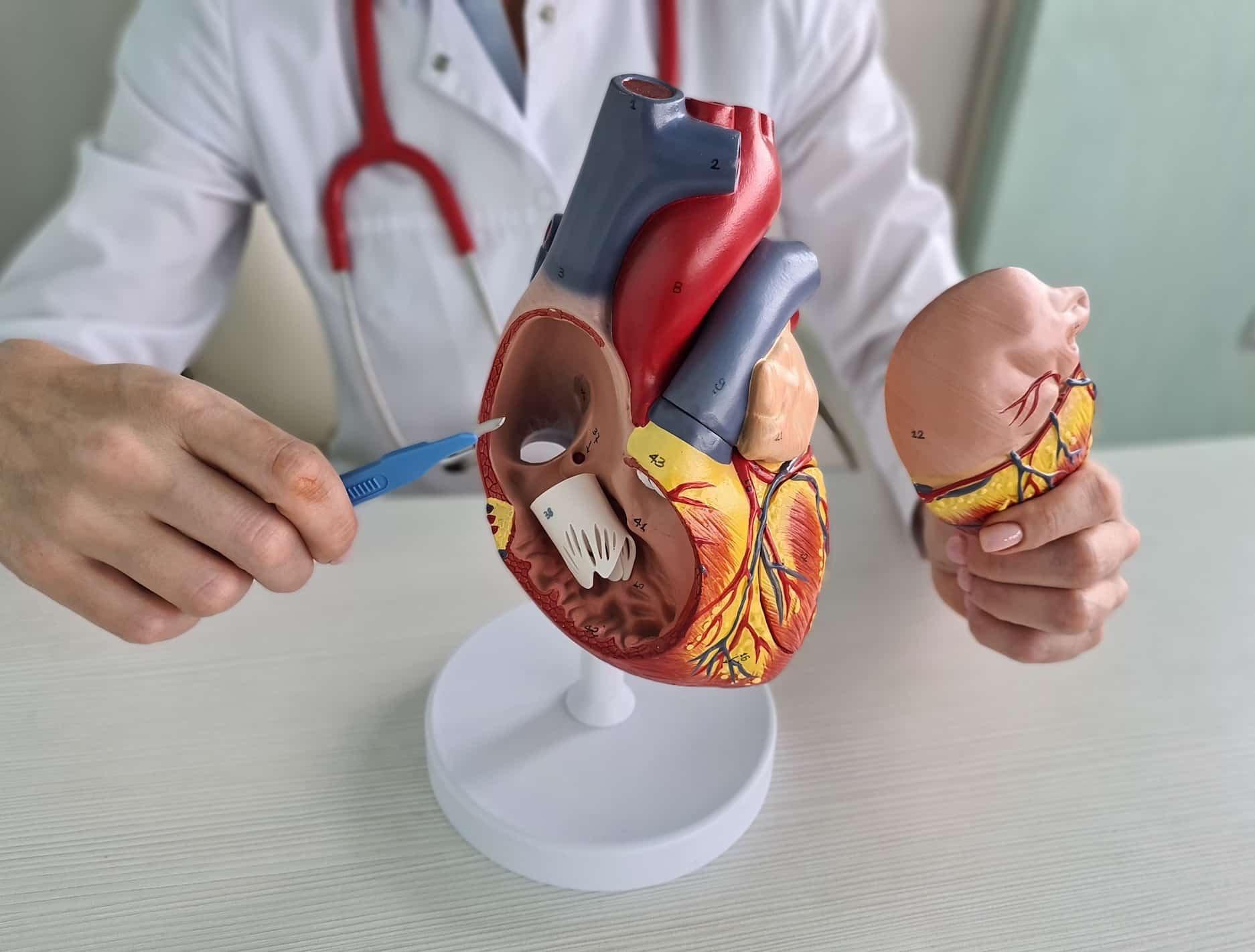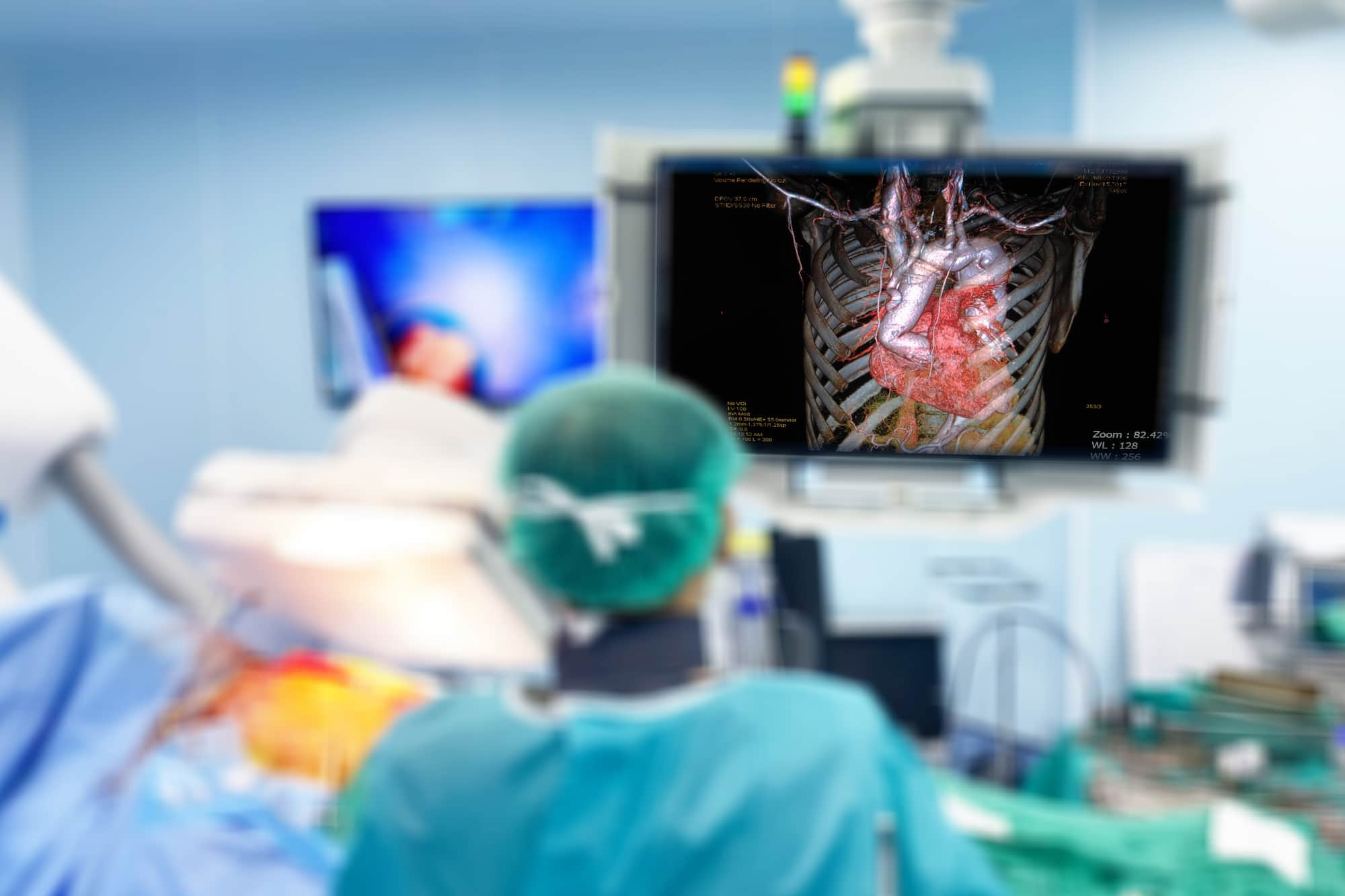Valve Replacement in Turkey
Healthy Türkiye helps you find the best valve replacement in Turkey at affordable prices and adopts a 360-degree service approach in all areas of health through affiliated hospitals.
- Medical Treatment
- Cardiac Surgery in Turkey
- Balloon Valvuloplasty in Turkey
- Coronary Angiography in Turkey
- Heart Bypass Surgery in Turkey
- Pediatric Cardiac Surgery in Turkey
- Aortic Aneurysm Surgery in Turkey
- Atherectomy in Turkey
- Cardiac Ablation Treatment in Turkey
- Carotid Endarterectomy in Turkey
- Coronary Angioplasty in Turkey
- DOR Procedure in Turkey
- Open Heart Surgery in Turkey
- Pacemaker Implantation in Turkey
- Valve Replacement in Turkey
- Defibrillator Implant Surgery in Turkey
- Transmyocardial Revascularization in Turkey
- Transcatheter Aortic Valve Replacement in Turkey
- Homepage
- Medical Treatment
- Valve Replacement in Turkey

What is Valve Replacement in Turkey?
Valve Replacement in Turkey is a surgical procedure performed to replace one of the heart’s valves when it is no longer functioning properly. The heart valves (mitral, aortic, tricuspid, and pulmonary) control the flow of blood through the heart, ensuring it moves in the correct direction. When one of these valves becomes damaged due to conditions like stenosis (narrowing) or regurgitation (leakage), a valve replacement may be necessary to restore normal heart function. In Turkey, patients have access to state-of-the-art medical facilities and highly skilled cardiac surgeons, making it a popular destination for those seeking quality and affordable healthcare.
Valve replacement surgery in Turkey can be performed using either mechanical or biological valves, depending on the patient's condition and preference. Mechanical valves are durable and long-lasting, but patients may need to take blood-thinning medications for life. Biological valves, often made from animal tissue, tend to have a more natural function but may require replacement after a certain period. The surgery can be performed through traditional open-heart surgery or minimally invasive techniques, and recovery typically involves a hospital stay followed by a period of rehabilitation.

About Valve Replacement in Turkey
Valve replacement surgery is used to address cardiac diseases such as aortic valve stenosis , bicuspid valves, congenital aortic valve, and aortic valve regurgitation by replacing the aortic valve. Learn more about heart valve replacement, aortic heart valve replacement, valve replacement technique, and heart valve replacement operation cost.
Valve replacement is a difficult type of heart surgery. You will find innovative technologies and viable valve replacement in Turkey. The Turkish Ministry of Health has recently gained notoriety for its acknowledgment of crucial cardiothoracic procedures. Every year, an estimated 140,000 patients in Turkey receive ICU treatment for severe septic shock, which is associated with infection, heart issues, and a high risk of death. Similarly, around 75,000 people receive cardiothoracic surgery therapy in Tukey each year.
There are four valves in the heart: mitral, aortic, tricuspid, and pulmonic. The aortic valve is located between the left verticle (also known as the lower chamber of the heart pumping) and the aorta, the largest artery in the body. Valves regulate the direction of blood flow from the heart.
Valve replacement in Turkey’s success rates grew from 85% to 90% due to the availability of advanced cardio technologies and the best cardiac surgeons. Heart surgery and minimally invasive aortic valve replacement in Turkey are expanding to stay up with scientific advancements in developed countries around the world in order to deliver quality health care at competitive prices.
Valve replacement surgery entails replacing valves that are no longer functional or have been damaged. The surgery is often reserved for patients whose valves cannot be treated using other methods. The valve replacement operation is conducted under general anaesthesia and involves the replacement of mechanical or biologic substitutes. A heart-lung bypass machine is also required for the surgery.
Aortic valve repair and valve replacement are operations used to repair or replace an aortic valve that has become damaged or diseased. The aortic valve is one of four valves in the heart that govern blood flow. It connects the lower left heart chamber (left ventricle) to the main artery of the body (aorta).
When the heart contracts (squeezes), the aortic valve opens, allowing blood to flow from the left ventricle into the aorta. The aortic valve closes when the heart relaxes to prevent blood from flowing backward. An aortic valve that is sick or damaged can obstruct blood flow and compel the heart to work harder to send blood to the rest of the body. Valve replacement can improve blood flow, alleviate symptoms of heart valve illness, and increase life expectancy.

We Care About Your Health
Healthy Türkiye provides the best for your health and comfort. You will feel privileged with us.
7/24 Quality Personal Assistance Throughout Your Journey
Customizable for You All-Inclusive Packages
Get the Right Advice for your Health
Valve Replacement Turkey
Valve replacement is a highly technical cardiac procedure. According to Turkish cardiac surgery experts, there are both minimally invasive and broad chest incision options for valve replacement. This medical technique is used to treat diseases or ailments that affect the aortic valve. The aortic valve’s specialized function is to control blood flow through the heart in the proper direction.
When the aortic valve is damaged by certain conditions or diseases, blood flow is disrupted, putting additional strain on the heart. It ultimately weakens your heart over time since it is under more strain than usual to send blood throughout the body. As a result, hiring the best medical specialists for valve replacement in Turkey will help you receive a hassle-free valve replacement with no issues.
When one or more of your heart valves become sick or damaged, surgery is performed. If you have one of these problems, it can impair the flow of blood through your heart in two ways:
If your valve does not fully open or gets stiff, it will obstruct blood flow. This is referred to as valve stenosis, or narrowing.
If the valve does not seal properly, blood will leak backward. This condition is known as valve incompetence, regurgitation, or a leaky valve.
You and your doctor can explore all of your treatment options in order to make the best decision. If you have few or no symptoms, your doctor may choose to investigate if healthy lifestyle changes and medication help.
Valve Replacement Surgery in Turkey
Valve replacement procedures are used to address aortic valve disease. Mild aortic valve disease with no symptoms may merely necessitate regular health checks. However, most aortic valve disorders are mechanical issues that necessitate surgery to alleviate symptoms and lower the risk of complications such as heart failure, heart attack, stroke, or death due to sudden cardiac arrest. Aortic valve disease types that may necessitate aortic valve repair or replacement include:
Aortic valve regurgitation: Blood flows backward through the aortic valve into the main pumping chamber of the heart (the left ventricle). Aortic valve regurgitation can be caused by a leaking or malfunctioning valve. Regurgitation can be caused by any disorder that affects the aortic valve. A newborn may be born with an abnormally shaped aortic valve ( congenital heart defect ), which causes regurgitation.
Stenosis of the aortic valve: The aortic valve is constricted or blocked. It is tough to open the valve accurately. The heart must work harder to push blood into the aorta. Aortic valve stenosis can be caused by a cardiac illness that is present at birth (congenital heart defect). Rheumatic fever is an infection that can induce inflammation and heart valve damage (rheumatic heart disease).
Other aortic valve issues are present at birth (congenital heart defects). Some newborns are born with an aortic valve that lacks a valve opening or has insufficient tissue flaps (cusps). A congenital cardiac abnormality can also result in the valve being the incorrect size or shape.
Incisions in minimally invasive and open heart surgery
Incisions in minimally invasive heart surgery and open heart surgery
Related information
Transcatheter valve replacement
In general, surgeons recommend valve repair when possible, as it reduces the risk of infection, saves the heart valve, and might improve heart function. The best option depends on the specific aortic valve issue as well as the expertise and experience of the healthcare team.
Aortic valve repair and valve replacement might be done through traditional open-heart surgery, which includes a cut (incision) in the chest, or by using minimally invasive techniques, which involve smaller incisions in the chest or a catheter inserted in the leg or chest Minimally invasive valve replacement surgery may involve a shorter hospital stay, quicker recovery and less pain than traditional open-heart surgery.
What type of valve surgery you have depends on your individual condition. For example, some people with aortic valve disease might not be candidates for traditional open-heart surgery due to other health issues, such as lung or kidney disease , that would make the procedure too complicated. Your healthcare provider will explain the benefits and risks of each option.

Valve Replacement Procedure in Turkey
Valve replacement in Turkey is conducted to replace the damaged or diseased cardiac valve. During a typical valve replacement, the damaged or diseased valve is replaced with a biological or synthetic valve, the choice of which depends on the condition of the patient.
There are four types of heart valves, aortic, mitral, tricuspid, and pulmonic. Any of these valves might get diseased or damaged during a person’s lifetime. However, heart valve replacement is most commonly performed on the diseased or damaged aortic valve.
On the other hand, mitral valves are the most common valves to be repaired. Pulmonary valve and tricuspid valve are rarely replaced or repaired. While minor issues related to the heart valve does not need any surgical treatment, the mild ones might be treated with the help of heart valve repair surgery. However, severe damage to the heart valve can be treated with the help of valve replacement surgery.
A cardiac valve might get damaged or diseased for a number of reasons. Narrowing of the valve (stenosis) and leakage of the valve (regurgitation) are the two most general reasons why an individual may need valve replacement surgery.
Heart valve replacement in Turkey is a fairly common procedure performed across all major multispecialty hospitals. Turkey is globally renowned for the quality of cardiac care services availed by some of the most experienced cardiac surgeons.

How Is Valve Replacement Performed in Turkey?
Heart valve replacement surgery is a cardiac operation used to repair or replace damaged or diseased heart valves. A highly trained cardiac surgeon performs the procedure under general anesthesia. The procedure can be done using either a traditional or a less invasive technique. A big incision is made from the neck to the stomach.
Minimally invasive surgery uses tiny instruments, which reduces surgical damage to the tissue and the risk of post-operative problems. While the heart is still beating, the surgeon removes the damaged valve and replaces it with a replacement while the patient is supported by a bypass machine that maintains blood circulating throughout the body and the lungs working during the operation. The valves are removed through an incision made in the patient’s aorta. The replacement valve is installed.
After the surgery, the patient is sent to a recovery room. A medical team monitors the patient until the effects of anesthesia wear off, at which point the patient is transferred to a normal room. After surgery, the patient is usually hospitalized for a week or more. The hospital stay is shortened with minimally invasive surgery.
The recovery time may differ from person to person depending on overall health, surgery complications, and other factors. The patient is given pain relievers as well as antibiotics to prevent infection. The medical team will monitor the dressing and seek for symptoms of infection. The surgeon will prescribe medications and provide instructions for at-home treatment.
Types of Valve Replacement in Turkey
Heart valve disease (also called heart valve disease), heart valve surgery, and treatments are done to repair or replace a heart valve that is not working properly. Heart valve surgery is an open heart surgery performed from the sternum to the chest. It’s a major procedure that can take two hours or more to complete, and recovery can take several weeks. Certain newer, less invasive techniques are available for certain types of valvular heart disease, but they are only available at a few facilities. There are several alternative ways to repair or replace valves.
Valve Repair Surgery
Surgical techniques are typically utilized to treat mitral or tricuspid valve abnormalities. Commissurotomy is a procedure used to treat a clogged valve. The valve flaps (leaflets) are removed to slightly relax the valve, allowing blood to flow freely. Annuloplasty is performed to repair a leaking valve. The annulus is a ring of fibrous tissue at the base of the heart valve. Sutures are sewn around the ring to close the opening in an expanded annulus.
Mechanical Valves: It uses metal, carbon, or plastic, which are long-lasting but enhance blood clot formation. You will be required to take blood-thinning drugs for the rest of your life. Your doctor will monitor your medication level on a frequent basis because too little won’t help clots and too much could cause significant bleeding, especially after an injury.
Biological Valves: These valves are made of animal tissue. Biological valves have a lifespan of 10-20 years, which is comparable to mechanical valves. They do not produce clots and do not require blood thinners.
Valvulotomy: It is a treatment that enlarges restricted heart valves. It is also possible to accomplish so with the assistance of a balloon.
Non-Surgical Valve Repair
Percutaneous or catheter-based operations are performed without the need for any incisions in the chest or the halting of the heart. Instead, a catheter is put into a blood vessel in your groyne or arm and then threaded through the blood vessels into your heart.
For stiffened or narrowed (stenosed) pulmonary, mitral, or aortic valves, percutaneous or balloon valvuloplasty /valvotomy is employed. Percutaneous mitral valve repair procedures, such as edge-to-edge repair, can repair a leaky mitral valve in a patient who is at high surgical risk.
Heart valve replacement: If your heart valve is too seriously damaged to repair, surgery to replace it with a new mechanical or biological valve may be required. In most cases, age plays a role in determining which type to use; biological valves are often chosen for older people. You and your doctor will talk about your options and decide which is best for you and your situation.
The first mechanical valves used in valve replacement surgery were made of long-lasting metals, carbon, ceramics, and plastic. Biological (also known as bioprosthetic) or tissue valves are carefully manufactured natural valves derived from human or animal donors.
Minimally invasive valve repair and replacement: Unlike conventional surgery, minimally invasive surgery does not involve sawing through the breastbone and opening the chest. It doesn’t require stopping your heart or using a heart-lung machine.
TAVI (transcatheter aortic valve implantation) is also known as transcatheter valve replacement. TAVI is a surgical valve replacement treatment that is performed in a minimally invasive manner to treat symptomatic aortic valve stenosis.
Recovery from Valve Replacement in Turkey
Following valve replacement surgery, the vast majority of patients are able to live a normal life. The success rate of heart valve replacement in Turkey is particularly high when compared to other countries throughout the world, indicating how successfully a patient can recover after the procedure. After surgery, the patient is usually instructed to take a few drugs for a few weeks. Depending on the patient’s condition and recovery, the duration of the drugs may be shortened or eliminated entirely.
The patient must visit the doctor as arranged for follow-up. During the follow-up visit, the doctor may request a few tests to check for tissue healing and to see how the replacement valve is working. The leading cardiac hospitals in Turkey ensure that patients heal quickly by assisting them in resuming their regular activities as soon as possible. Furthermore, the best cardiac hospitals in Turkey offer cutting-edge rehabilitation services, allowing patients to return to their normal life as soon as feasible. Cardiac patients receive specific care around the clock, making them feel guided and loved in a special way.
The day after the surgery, you will normally be assisted in getting out of bed. You should expect some discomfort following your surgery, and you will be given pain medicine. Your pain level will be monitored to ensure that you are as comfortable as possible. Many individuals return home within a week, although recovery time varies depending on the type of operation and how your body responds. It takes an average of 2-3 months to fully heal, although this can vary because everyone responds differently to a treatment.
To avoid blood clots if you have a mechanical valve, you will need to take at least one type of blood thinning medicine. Because your body’s natural reaction to an artificial material is to try to ‘repair’ it, a clot can form. You’ll be told how long you’ll need to take the drug, and the doctor will address any prescription modifications you’re currently taking. You may need to take anticoagulants for a shorter period of time if you have a tissue valve replacement. This could happen anywhere between a few weeks and 2-3 months after surgery.
Minimally Invasive Method of Aortic Valve Surgery
It is an aortic valve operation. Without accessing the entire chest, doctors make 2-4-inch incisions. This is usually done with a “J” incision to keep your chest stable. Minimally invasive surgery reduces trauma, blood loss, and hospital stay while also hastening recovery. The majority of individuals who require isolated aortic valve surgery are candidates for minimally invasive aortic valve surgery. Only after a diagnosis and tests to establish if a patient requires this operation. Contact Healthy Türkiye if you need surgical valve replacement in Turkey.
Which Kind of Heart Valve Implant Is a Better Choice?
There are basically two types of valve implant – biological/tissue valve and mechanical valve. Both mechanical prosthetics and bio-prosthetic valves have almost the same success rate, but they have their own pros and cons. The choice of the right valve is based on factors such as age, other heart complications, overall health, and others.
However, the performance of the heart valve after the surgery may depend on other factors such as other complications and the flow of blood through the valves. Mechanical prosthetics have more durability than biological ones but patients have to use blood-thinning medications for the rest of their lives, which may have an impact on their quality of life.
2026 Cost of Valve Replacement in Turkey
All types of medical attentions like valve replacement are very affordable in Turkey. Many factors are also included in determining the cost of valve replacement in Turkey. Your process with Healthy Türkiye will last from the time you decide to have a valve replacement in Turkey until the time you are fully recovered even if you are back home. The exact valve replacement procedure cost in Turkey depends on the type of operation involved.
All types of medical attentions like valve replacement are very affordable in Turkey. Many factors are also included in determining the cost of valve replacement in Turkey. Your process with Healthy Türkiye will last from the time you decide to have a valve replacement in Turkey until the time you are fully recovered even if you are back home. The exact valve replacement procedure cost in Turkey depends on the type of operation involved.
At clinics or hospitals contracted with Healthy Türkiye, patients will receive the best valve replacement from specialist doctors in Turkey at affordable rates. Healthy Türkiye teams provide medical attention valve replacement procedures and high-quality treatment to patients at a minimum cost. When you contact Healthy Türkiye assistants, you can get free information about the cost of valve replacement in Turkey and what this cost covers.
The cost of private mitral valve repair or replacement in the UK is about £35,000.
The cost of private mitral valve repair or replacement in the USA is about $134,300
The cost of private mitral valve repair or replacement in Turkey is about $20.000.
Price of Valve Replacement in the UK
Price of Valve Replacement in the USA
Price of Valve Replacement in Turkey
Why Is Valve Replacement Cheaper in Turkey?
One of the main considerations before traveling abroad for valve replacement is the cost-effectiveness of the whole process. Many patients think that when they add flight tickets and hotel expenses to their valve replacement costs, it will become very expensive to travel, which is not true. Contrary to popular belief, round-trip flight tickets to Turkey for valve replacement can be booked very affordably. In this case, assuming you are staying in Turkey for your valve replacement, your total travel expense of flight tickets and accommodation will only cost less than any other developed country, which is nothing compared to the amount that you are saving.
The question “Why is valve replacement cheaper in Turkey?” is so common between patients or people simply curious about getting their medical treatment in Turkey. When it comes to valve replacement prices in Turkey, there are 3 factors allowing cheaper prices:
The currency exchange is favorable for whoever looking for valve replacement has a euro, dollar, or pound;
The lower cost of living and cheaper overall medical expenses such as valve replacement;
For valve replacement, incentives are given by the Turkish Government to medical clinics working with international clients;
All these factors allow for cheaper valve replacement prices, but let’s be clear, these prices are cheaper for people with strong currencies (as we said, euro, dollar, Canadian dollar, pound, etc).
Every year, thousands of patients from all over the world come to Turkey to get valve replacement. The success of the healthcare system has increased in recent years, especially for valve replacement. It’s easy to find well-educated and English-speaking medical professionals in Turkey for all kinds of medical treatment such as valve replacement.
Why Choose Turkey for Valve Replacement?
Turkey is a common choice among international patients seeking advanced valve replacement. Turkey’s health procedures are safe and effective operations with a high success rate like valve replacement. The increasing demand for high-quality valve replacement at affordable prices has made Turkey a popular medical travel destination. In Turkey, valve replacement is performed by highly experienced and trained doctors with the most advanced technology in the world. valve replacement is done in Istanbul, Ankara, Antalya, and other major cities. The reasons for choosing valve replacement in Turkey are as follows:
High-quality hospitals: Joint Commission International (JCI) accredited hospitals have dedicated valve replacement units that are specially designed for patients. International and national strict protocols provide effective and successful valve replacement for patients in Turkey.
Qualified experts: The expert teams include nurses and specialist doctors, together to carry out valve replacement according to the patient’s needs. All the included doctors are highly experienced in performing valve replacement.
Affordable price: The cost of valve replacement in Turkey is affordable compared to Europe, the USA, the UK, Singapore, Australia, etc.
The high success rate: Highly experienced specialists, the best available technology, and stringently followed safety guidelines for post-operative care of the patient, resulting in a high success rate for valve replacement in Turkey.
Is Valve Replacement Safe in Turkey?
Did you know Turkey is one of the most visited destinations for valve replacement in the world? It is ranked one of the most visited tourist destinations for valve replacement. Over the years it has also come to be a very popular medical tourism destination too with many tourists coming in for valve replacement. There are so many reasons why Turkey stands out as a leading destination for valve replacement. Because Turkey is both safe and easy to travel to too with a regional airport hub and flight connections to pretty much everywhere, it is preferred for valve replacement.
The best hospitals in Turkey have experienced medical staff and specialists who have performed thousands of medical services such as valve replacement. All procedures and coordination related to valve replacement are controlled by the Ministry of Health in accordance with the law. Over many years, the greatest progress in medicine has been observed in the field of valve replacement. Turkey is known among foreign patients for its great opportunities in the area of valve replacement.
To emphasize, besides the price itself, the key factor in selecting a destination for valve replacement is certainly the standard of medical services, the hospital staff’s high expertise, hospitality, and the safety of the country.
All-Inclusive Packages for Valve Replacement in Turkey
Healthy Türkiye offers all-inclusive packages for valve replacement in Turkey at much lower prices. Extremely professional and experienced doctors and technicians carry out the high quality valve replacement. The cost of valve replacement in European countries can be quite expensive, especially in the UK. Healthy Türkiye provides cheap all-inclusive packages for a long and short stay of valve replacement in Turkey. Because of many factors, we can provide you with many opportunities for your valve replacement in Turkey.
The price of valve replacement differs from other countries due to medical fees, staff labor prices, exchange rates, and market competition. You can save much more in valve replacement compared to other countries in Turkey. When you purchase valve replacement all-inclusive package with Healthy Türkiye our healthcare team will present of hotels for you to choose from. In valve replacement travel, you will have the price of your stay included in the all-inclusive package cost.
In Turkey, when you purchase valve replacement all-inclusive packages through Healthy Türkiye, you will always receive VIP transfers. These are provided by Healthy Türkiye, which is contracted with highly qualified hospitals for valve replacement in Turkey. Healthy Türkiye teams will organize everything about valve replacement for you and have you picked up from the airport and safely brought to your accommodation. Once settled in the hotel, you will be transferred to and from the clinic or hospital for valve replacement. After your valve replacement has been successfully completed, the transfer team will return you to the airport in time for your flight home. In Turkey, all packages of valve replacement can be arranged upon request, which relaxes the minds of our patients. You can reach out Healthy Türkiye for everything you need to know about valve replacement in Turkey.
The Best Hospitals in Turkey for Valve Replacement
The best hospitals in Turkey for valve replacement are Healthy Türkiye, Memorial Hospital, Acıbadem International Hospital, and Medicalpark Hospital. These hospitals attract patients from all over the world seeking valve replacement due to their affordable prices and high success rates.
Best Doctors and Surgeons in Turkey for Valve Replacement
The best doctors and surgeons in Turkey for valve replacement are highly skilled professionals who offer specialized care and advanced procedures. With their expertise and state-of-the-art techniques, these specialists ensure that patients receive high-quality valve replacement and achieve optimal health results.

Frequently Asked Questions
Surgery is needed when someone undergoes heart valve stenosis or regurgitation along with related symptoms that can’t be managed with medicines.
Just like any surgical operation, patients undergoing heart transplant operations are at risk of disease, reaction to anesthesia, or excessive bleeding. Other risks associated with heart valve treatment may abnormal heart rhythms, valve leakage, blood clots, stroke, heart failure, and death.
In certain patients, valves have lasted as long as 25 years without any issues. But they’re opportunities that fresh artificial valves could endure for the rest of life. There are instances when a valve needs to be substituted within a matter of months or years, for any range of reasons.
The patient will be counseled to take blood thinners after the valve replacement in Turkey.
All heart valve replacements in Turkey are completely safe with x-ray examinations or MRIs.
An entire recovery following valve replacement might take a couple of months, and this may also be dependent on the patient’s overall health before the operation.
